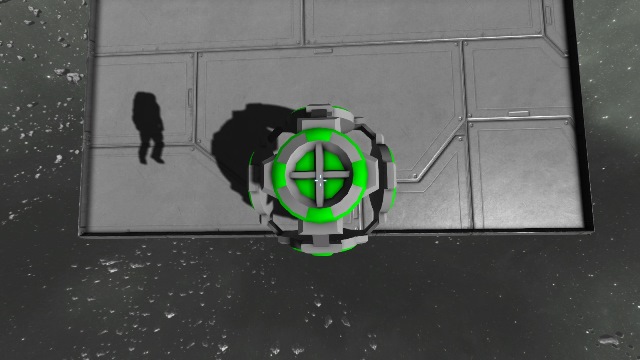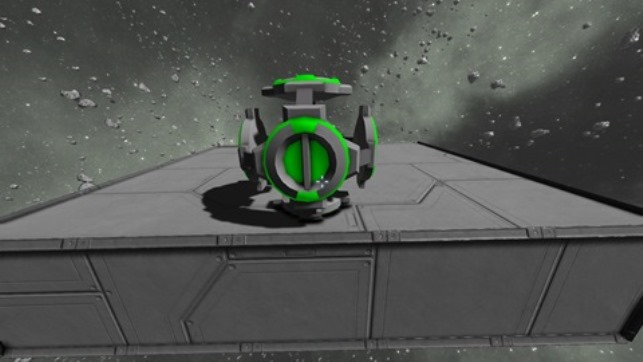Difference between revisions of "Projector Guide"
m (→Projection: + link) |
m (→Projectors As Permanent Repair Templates: + wiki link to recursion) |
||
| (2 intermediate revisions by the same user not shown) | |||
| Line 11: | Line 11: | ||
==Projection Basics== | ==Projection Basics== | ||
| − | * only one [[Grid|grid]] is supported (grids behind rotor are not projected) | + | * only one [[Grid|grid]] is supported (grids behind [[Rotor|rotor]] and [[Piston|piston]] are not projected) |
* grid size of the blueprint must match the grid size of the projector (you can project large ship and station blueprints only from the large projector block. Small projector block can project only small ship blueprints) | * grid size of the blueprint must match the grid size of the projector (you can project large ship and station blueprints only from the large projector block. Small projector block can project only small ship blueprints) | ||
* projection has no physics and it is not triggering sensors | * projection has no physics and it is not triggering sensors | ||
| Line 44: | Line 44: | ||
Now your ship's blueprint includes a projector that is preconfigured to project the ship, ''including'' a copy of itself that is preconfigured to project... you get the idea. Now you're ready to build the ship for real in Survival Mode. | Now your ship's blueprint includes a projector that is preconfigured to project the ship, ''including'' a copy of itself that is preconfigured to project... you get the idea. Now you're ready to build the ship for real in Survival Mode. | ||
| − | '''Warning''' Space Engineers deeply, or more specifically, recursively scans grids when making blueprints. It will also scan the blueprint loaded into a projector, recursively. So if you perform the steps above more than once your blueprint file size is getting larger. Before starting with step 1 above, it's best to clear the blueprints from the projector(s) on the ship. This way you'll only have one series of recursion happening in your blueprint. This will keep the file size optimally small. | + | '''Warning''' Space Engineers deeply, or more specifically, [[Wikipedia:recursion|recursively]] scans grids when making blueprints. It will also scan the blueprint loaded into a projector, recursively. So if you perform the steps above more than once your blueprint file size is getting larger. Before starting with step 1 above, it's best to clear the blueprints from the projector(s) on the ship. This way you'll only have one series of recursion happening in your blueprint. This will keep the file size optimally small. |
===Bootstrap operation=== | ===Bootstrap operation=== | ||
Latest revision as of 02:34, 31 January 2019
The Projector Block, introduced in Update 01.058, allows Blueprints to finally be used in Survival Mode. This block allows an image of the blueprinted ship to be projected and thus constructed in place.
Contents
Features
A Projector block, in both Creative and Survival modes, can perform as follows
- players can select a blueprint to project in the projector control panel
- projection can be moved around (set horizontal/vertical/forward offset and set yaw/pitch/roll)
- players can see the build progress and statistics for the projected ship/station on the projector control panel
- players are able to use the blueprint's menu (F10) and save blueprints (Ctrl+B) in survival mode
Projection Basics
- only one grid is supported (grids behind rotor and piston are not projected)
- grid size of the blueprint must match the grid size of the projector (you can project large ship and station blueprints only from the large projector block. Small projector block can project only small ship blueprints)
- projection has no physics and it is not triggering sensors
- projection is always attached and aligned to the projector grid and moves with it
Welding + Placing
When starting a ship from scratch, make sure to align the hologram to the projector and start adding blocks that are next to the projector (or to blocks connected to the projector). Blocks that will be valid for construction will be highlighted. You can also check the info panel of the projector for any warnings.
- projected blocks can be placed/welded when projected block is in range of a welder
- only blocks neighboring with existing blocks can be placed
- when the projected block is colliding with anything else, it cannot be placed
- it's possible to project a blueprint on any existing ship, to repair/rebuild it
Projectors As Permanent Repair Templates
While it's simple enough to set up an ad hoc projector to build a fresh ship from a blueprint, projectors can also be extremely useful to include permanently into a ship or station design, as a reference for repairing damage. The more sophisticated a ship is, or the more likely it is to become damaged, the more beneficial this is. Here's a brief guide to making the most of it.
When designing a ship in Creative Mode, include a projector somewhere that is:
- fairly unlikely to be damaged, such as deep in the center and/or shielded with heavy armor
- oriented sensibly (e.g., projector's "cross" faces toward the top and "bar" faces toward the aft of the ship)
- somewhat accessible by an engineer
We'll call this the "repair projector". Accessible in this case means having enough adjacent empty space that you could build another projector (call it the "bootstrap projector") attached to it, along with whatever additional blocks would be needed to power, command, and secure the bootstrap projector, with minimal overlap of this assembly with the ship's structure. Do not, however, physically include the bootstrap projector in your ship design.
Don't worry about any of the repair projector's settings until the rest of your design is complete; configuring it should be the very last thing you do when you are completely satisfied.
Once you are finished with your ship design and build:
- Create a blueprint of the ship with Ctrl-B.
- Set the repair projector to project that new blueprint.
- Set the projector to "Keep Projection: On". This is crucial, because otherwise the projector will clear its blueprint selection as soon as the projection is properly aligned. ("Show Only Buildable: On" may be helpful, but this is a matter of taste.)
- Adjust the rotations and offsets until the projection aligns perfectly with the solid ship. Write all these values down for later reference.
- With the projector block On, check that its status in the Terminal includes the word "Complete!", then be sure to turn the projector Off. (The status may also warn that the projection is out of bounds, but this is okay.)
- Optional: If you want to add any hotkey assignments to toggle the repair projector On and Off from a seat, do this now. However, make a note of exactly which hotkeys you used, as you may have to reassign them after building a new copy of the ship.
- Use Ctrl-B on the ship again, select the existing blueprint, and click on "Replace With Clipboard". You may also want to Refresh Blueprints and delete any additional copies of the ship that were added to the list, just to avoid confusion.
Now your ship's blueprint includes a projector that is preconfigured to project the ship, including a copy of itself that is preconfigured to project... you get the idea. Now you're ready to build the ship for real in Survival Mode.
Warning Space Engineers deeply, or more specifically, recursively scans grids when making blueprints. It will also scan the blueprint loaded into a projector, recursively. So if you perform the steps above more than once your blueprint file size is getting larger. Before starting with step 1 above, it's best to clear the blueprints from the projector(s) on the ship. This way you'll only have one series of recursion happening in your blueprint. This will keep the file size optimally small.
Bootstrap operation
To build the ship from scratch (for example, on a planet), start by building a "bootstrap projector" as mentioned earlier. Knowing exactly how to shape this temporary assembly can be tricky, because it depends greatly on the shape of your ship, the location of the repair projector in relation to the rest of the ship (especially power supplies), and the shape of your surroundings. Ultimately, you want to be able to power the bootstrap projector and project the blueprint such that:
- the blueprint overlaps little to no existing structures you need to keep.
- the bootstrap projector and the image of the repair projector are touching (i.e. adjacent blocks to each other). Check the rotations and offsets of the bootstrap projector against the settings you wrote down from the repair projector; they should be identical except that one of the offsets is off by 1. If this is not the case, your bootstrap projector is in the wrong orientation, so destroy it and try again.
- the bootstrap projector has a unique name that won't be confused with the repair projector. (Painting the entire bootstrap assembly in a color that contrasts with the ship can also help to clarify things visually.)
- the bootstrap projector and its power supply will be able to remain in place; if not until the entire ship is complete, then at least until there's a continuous path of blocks from some of the ship's power supplies to the repair projector.
Despite that last requirement, you actually don't want to use the bootstrap projector at all, except to build the repair projector. As soon as your bootstrap assembly is in place and the blueprint is projected where you want it, build the repair projector and no other blocks, then immediately turn the bootstrap projector Off and the repair projector On. The projection should reappear in exactly the same position and orientation as before. (If it doesn't, then again your bootstrap projector was not oriented correctly, so destroy both projectors and try again.) You need to build the entire ship from the repair projection because otherwise any blocks you later rebuild from the repair projection will be "foreign", in the sense that any hotkeys assigned to them will be broken.
Now build the ship against the blueprint as normal, but give preference to whatever parts will allow the ship to power its own repair projector as soon as possible. You'll also want to be sure that the ship will not destroy itself or go spinning out of control without the bootstrap assembly as an anchor, so the ship may need functioning thrusters, gyroscopes, and/or landing gear. As soon as that's the case, grind away all the blocks that were part of the bootstrap assembly, being extra careful not to damage the repair projector. Then proceed with the rest of the construction. When it's complete, switch the repair projector Off. It's wise to check all hotkey assignments in cockpits, flight seats, and so on, to be sure they linked up correctly with the newly-built blocks. Hotkeys that control the repair projector may need to be reassigned (presumably because the repair projector is the ship's only block that was technically built from a separate instance of the blueprint), but if you're lucky all other assignments will be intact.
Enjoy your new ship. When enjoyment inevitably leads to some of it being destroyed, simply switch the repair projector back On. It's already loaded with the correct blueprint and alignment, so any blocks that need rebuilding will magically appear for you to weld back into place. The projector's terminal screen will even helpfully tell you exactly how many blocks are missing.
Projector Orientation
Upper side (marked with +):
Back side (marked with |):

